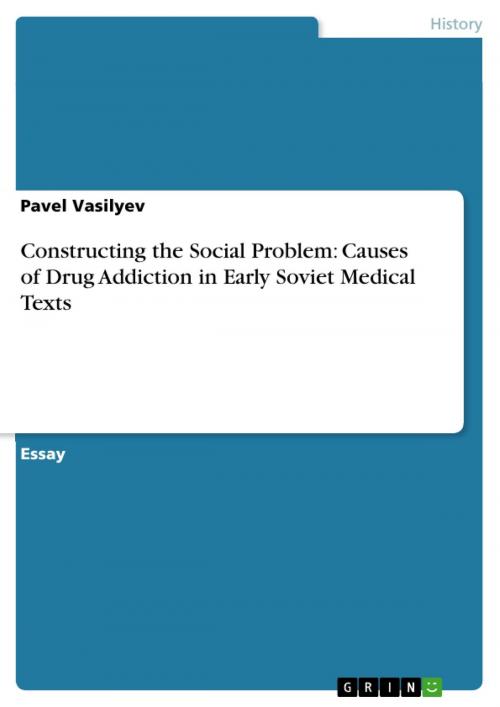Constructing the Social Problem: Causes of Drug Addiction in Early Soviet Medical Texts
Nonfiction, History, Modern, 20th Century| Author: | Pavel Vasilyev | ISBN: | 9783640783632 |
| Publisher: | GRIN Publishing | Publication: | December 22, 2010 |
| Imprint: | GRIN Publishing | Language: | English |
| Author: | Pavel Vasilyev |
| ISBN: | 9783640783632 |
| Publisher: | GRIN Publishing |
| Publication: | December 22, 2010 |
| Imprint: | GRIN Publishing |
| Language: | English |
Essay from the year 2010 in the subject History Europe - Other Countries - Ages of World Wars, grade: A-, University CEU San Pablo Madrid, language: English, abstract: In the last two decades, there seems to be a consensus between Russian physicians, sociologists, and the general public, that drug addiction should be considered a serious and threatening social problem. The authorities, however, are unable to stop the increasing numbers of drug users. Meanwhile, as Ia. I. Gilinskii put it, social deviations are 'the mirror of social realities', and the power structure should not avoid looking in it. Drug addiction became a major social problem, for which no one-sided solution is acceptable. The attempts to approach the topic from the narrow viewpoint of some sociological or medical theory usually fail - as do the methods of plain administrative repression. The terms narkotik, narkoman, narkomaniia, narkotizm are applied in a somewhat simplified manner (as an unambiguous social evil), and it further complicates the understanding of an already difficult phenomenon. There is also a clear lack of attention towards social, psychological, economic and other incentives for an individual to take drugs. Therefore, the need for a more synthetic and complex approach is obvious, and in search for it we should also look at the developments in the past and the history of drug addiction in Russia. The focus of this paper is on the early Soviet period of Russian history (ca. 1917-1929) and on the medical texts of that period. My aim will be to look at early Soviet medical texts related to recreational drugs to show how physicians described the causes of drug addiction - and thus contributed to the construction of the social problem. The causes of the problem are especially important and relevant for the medical discourse, as the etiology of disease often gives physicians the clue to the solutions and treatment. Accordingly, the origins of drug addiction as described in early Soviet medical texts greatly influenced the understanding of drug addicts and practical narcotic policy among the medical community - and also beyond (as physicians tried to achieve symbolic domination). In particular, I want to consider three large groups of potential causes that were detected by early Soviet physicians: socio-political (such as war or revolution), economical (like capitalism or foreign trade), and other (it includes various causes on the macro- and micro-scale alike that range from regime of prohibition to sexual frustration to the use of drugs za kompaniiu).
PhD (Kandidat Nauk), Russian History, St. Petersburg Institute of History of the Russian Academy of Sciences, 2013 MA, Central European History and Jewish Studies, Central European University (Budapest, Hungary), 2010 (with distinction) BA (Specialist Degree), History, St. Petersburg State University, Russia, 2009
Essay from the year 2010 in the subject History Europe - Other Countries - Ages of World Wars, grade: A-, University CEU San Pablo Madrid, language: English, abstract: In the last two decades, there seems to be a consensus between Russian physicians, sociologists, and the general public, that drug addiction should be considered a serious and threatening social problem. The authorities, however, are unable to stop the increasing numbers of drug users. Meanwhile, as Ia. I. Gilinskii put it, social deviations are 'the mirror of social realities', and the power structure should not avoid looking in it. Drug addiction became a major social problem, for which no one-sided solution is acceptable. The attempts to approach the topic from the narrow viewpoint of some sociological or medical theory usually fail - as do the methods of plain administrative repression. The terms narkotik, narkoman, narkomaniia, narkotizm are applied in a somewhat simplified manner (as an unambiguous social evil), and it further complicates the understanding of an already difficult phenomenon. There is also a clear lack of attention towards social, psychological, economic and other incentives for an individual to take drugs. Therefore, the need for a more synthetic and complex approach is obvious, and in search for it we should also look at the developments in the past and the history of drug addiction in Russia. The focus of this paper is on the early Soviet period of Russian history (ca. 1917-1929) and on the medical texts of that period. My aim will be to look at early Soviet medical texts related to recreational drugs to show how physicians described the causes of drug addiction - and thus contributed to the construction of the social problem. The causes of the problem are especially important and relevant for the medical discourse, as the etiology of disease often gives physicians the clue to the solutions and treatment. Accordingly, the origins of drug addiction as described in early Soviet medical texts greatly influenced the understanding of drug addicts and practical narcotic policy among the medical community - and also beyond (as physicians tried to achieve symbolic domination). In particular, I want to consider three large groups of potential causes that were detected by early Soviet physicians: socio-political (such as war or revolution), economical (like capitalism or foreign trade), and other (it includes various causes on the macro- and micro-scale alike that range from regime of prohibition to sexual frustration to the use of drugs za kompaniiu).
PhD (Kandidat Nauk), Russian History, St. Petersburg Institute of History of the Russian Academy of Sciences, 2013 MA, Central European History and Jewish Studies, Central European University (Budapest, Hungary), 2010 (with distinction) BA (Specialist Degree), History, St. Petersburg State University, Russia, 2009















